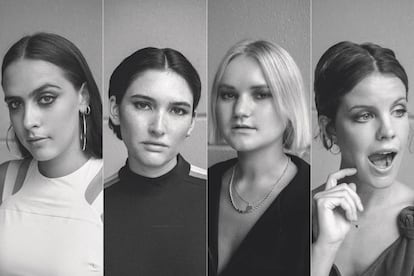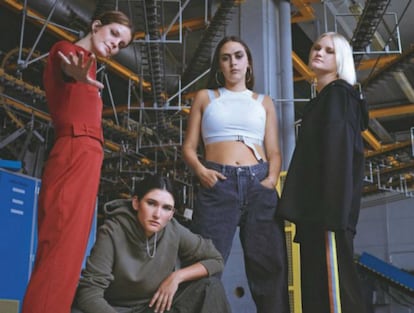Hinds: “We protect each other from sexual harassment”
The Spanish all-female music group talks about fighting sexism in the male-dominated rock industry

Spanish band Hinds burst onto the national and international indie rock stage four years ago, wowing critics and audiences alike with their powerful garage sound. In 2014, when the band was made up of just Carlotta Cosials and Ana García Perrote, they released the song “Bamboo.” It was written in English, a decision that came naturally, says Cosials: “We are the generation of ESO [Compulsory Secondary School] in English and the music we like uses this language.”
You have to fight to be treated equally. If you don’t fight, you are swallowed up
Ade Martín on bass and Amber Grimbergen later joined the duo and the band was quickly thrust into fame, bolstered by social media, English lyrics and a sound more aptly described as aggressive than melodic – “we learned how to play well as we went along,” confesses Cosials. In the blink of an eye, the four “posh girls” from Madrid’s Malasaña neighborhood had become a serious music sensation, drawing acclaim from The Guardian newspaper and music magazine The Fader. British publication NME nominated Hinds as best new artist and British pop icon Bobby Gillespie, the lead singer of Primal Scream, wrote the group is “even better live when all the guitars are out of tune” after seeing them in concert.
Hinds is now embarking on a world tour. “Bands that have been doing this for 10 years don’t understand when four girls arrive and they play in London or at the Glastonbury festival with just one album out, [Leave Me Alone, 2016],” says the group.
But while the band may have fame, fortune has not yet followed. Hinds will be traveling in a van, “we are not big enough to have our own bus,” they say and the cost of the tour will be covered by band’s management agency and their parents. “We tour without luxury, we go to hostels, we share the shower. We have been working for two years and haven’t seen a cent. But you have to take a risk,” they add.
In spring, the group released their second album, I Don’t Run (2018). Their critics in Spain were less harsh this time, but says Hinds: “At this point we now know that this country is not key to sales. Our market is overseas.”

But while the girls may be traveling lightly, their journey has not been without glamor. One night they were invited by American singer Selena Gomez for a swim at her mansion. “It was the typical story of a friend of a friend who invited Selena to the concert. And then she suggested ending the party in her house.” The music of the former Disney actress is not among the group’s favorites but they would never think of criticizing her for being a pop star.
“We have been judged so much for being where we are, and more because we are women, that we know how much Selena has had to go through to get where she is,” the band explains. “Nor would we criticize Taylor Swift, who embodies much of what we are not. We can only admire them without judgment.”
A boy band that performs at the same time but on a different day charges more than us
Hinds too has had to battle against the sexism of the male-dominated music industry. “It’s pretty fucked up,” they say. “We’re talking about bands, record companies, the press. It is a man’s world with antiquated and manly ways of acting.”
When asked whether Hinds is a feminist band, the band replies with a resounding: “Of course! We don’t write protest lyrics, we prefer to sing about other issues but just by being here, by being women, female workers in the music industry, you have no other option than to be feminist. You have to fight to be treated equally. If you don’t fight, you are swallowed up.”
According to the girls, Hinds is paid less than other all-male bands at festivals. “A boy band that performs at the same time but on a different day, or the same day but on a smaller stage, charges more than us. That’s not even mentioning how organizers tend to put us in the opening slot in the festival. How could you put four girls on at night when that’s when the serious bands play!”
Women are so poorly recognized in the rock industry that sometimes festival employees don’t believe the girls are real musicians. Martin recounts one example: “There’s often a lot of noise in the dressing room or no coverage so you go out to the street to talk on the phone. When you return, the doorman stops you. He laughs in your face that you could be the group that’s going to play.
“Then you have to call someone inside to come get you. I don’t think they do it out of ill will, it just doesn’t occur to these guys.”
Added to this, is the sexism they experience from fellow musicians. “Many don’t know how to act when there are girls backstage who aren’t fans. You’re friendly and smile with a male musician. You treat them like a colleague. And he thinks a) You’re flirting, b) She’s hot, I’m going to score, c) Don’t come any closer, I have a girlfriend. It makes you furious. If we were boys, in a matter of seconds it would be ‘Hey bro, you and me are like this’.”
“Everything changes if we are girls. An enormous barrier goes up. I don’t know if its from lack of education or because they have never had a female friend and don’t know how to relate to women,” they add.
You have to be a real idiot to try to harass four women at once
On the subject of sexual harassment – an issue that has plagued the Hollywood film industry, inspiring the #MeToo movement, the band explains that “it hasn’t happened to us because we are always together. You have to be a real idiot to try to harass four women at once. But there are fans who try to overstep the mark. You take the selfie and put a stop to it at once.”
“The myth of the rock star doing it with lots of groupies at the same time cannot be transferred to women,” they add. “It would be bad luck to come across a group of psychopathic women endangering the life of a musician. But being a girl, it’s different. At first they may seem really lovely but as the night goes on they become rougher.”
Female musicians, say Hinds, have to look out for one another. “As girls they teach you that a woman cannot be left unconscious on the street at night. We know some musicians whose band members write the address of their hotel on their arms. Or a telephone number. We would never do that. We would never lose contact with one of the girls. We protect one another. It’s like that with women.”
English version by Melissa Kitson.
Tu suscripción se está usando en otro dispositivo
¿Quieres añadir otro usuario a tu suscripción?
Si continúas leyendo en este dispositivo, no se podrá leer en el otro.
FlechaTu suscripción se está usando en otro dispositivo y solo puedes acceder a EL PAÍS desde un dispositivo a la vez.
Si quieres compartir tu cuenta, cambia tu suscripción a la modalidad Premium, así podrás añadir otro usuario. Cada uno accederá con su propia cuenta de email, lo que os permitirá personalizar vuestra experiencia en EL PAÍS.
¿Tienes una suscripción de empresa? Accede aquí para contratar más cuentas.
En el caso de no saber quién está usando tu cuenta, te recomendamos cambiar tu contraseña aquí.
Si decides continuar compartiendo tu cuenta, este mensaje se mostrará en tu dispositivo y en el de la otra persona que está usando tu cuenta de forma indefinida, afectando a tu experiencia de lectura. Puedes consultar aquí los términos y condiciones de la suscripción digital.








































